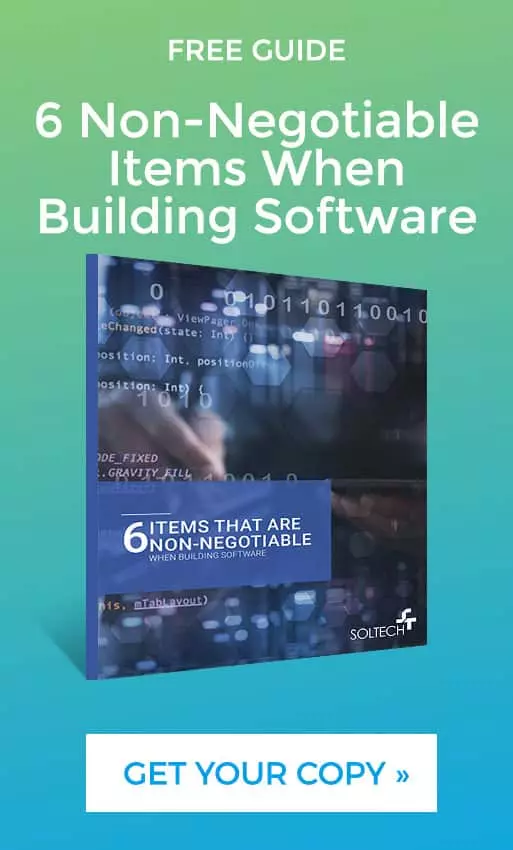
Software Development Pricing, Explained: What Requirements Do You Need for a Quote?
By Ann Mooney
Requirements are an important part of the information you must gather when pricing a software development project. After all, how can you know how much something will cost to build if you don’t understand what it will do?
But, there’s a dilemma in software development cost estimation:
- How do you justify building requirements before you see a quote?
- How do you get a quote without requirements?
So, when you want a quote and you need requirements, how do you bridge the impasse? It comes down to knowing which requirements you absolutely need to create the right quote when pricing software development.
How Do You Create Good Requirements?
In custom software development, requirements are essential, especially when it comes to pricing the software development project. That’s why we’ve covered them in several past posts:
- How Should I Document My Software Requirements?
- Software Design vs. Software Requirements
- Why Business Objectives Are Not The Same as Software Requirements
- Top 5 Problems When Writing Software Requirements
Beyond documenting requirements, avoiding common pitfalls, and differentiating your software requirements from business objectives, it’s also important to pull the right team together to assemble and draft them. Having the right team in place can make your life a lot easier when preparing your software development quote.
The best team to draft requirements includes your solution architects, key stakeholders, and project/product managers. But, you also need a business analyst to analyze what users will do, pull those requirements together, and bridge their business needs to what’s technologically possible.
Why Are Requirements Important?
When you think about building custom software, you could compare it to building a home. Sure, houses have been built before, but that doesn’t mean you can use someone else’s blueprints to build your house, assuming that they will work for you too.

Hire a builder (software developer) and give them vague requirements, and you could end up with a house with no closets, three bedrooms with no hallway, or both bathrooms upstairs. Perhaps any of those configurations could work for you, but without requirements, you leave the project (and its details) in the hands of the builder. Worse yet, it could be difficult to estimate costs. That’s why requirements are crucial. Without them, the software development pricing process could be stressful for your team.
Software Requirement Specification: Different Users Want Different Things
Let’s continue with our homebuilding analogy. Ask ten homebuyers to describe their dream home, and you’ll likely get ten unique answers. The same goes for software development. Ask ten developers what their ideal software development project looks like, and you’ll likely receive ten different ideas. Pricing these software development projects is another thing entirely.

When you set out to develop your requirements, consider:
- The users who will be served by the software
- What users think the software will do
- What the user intends to do
- What you are trying to accomplish
Think of the user roles and personas who will use the system after it goes live. For example, in a call center environment, this would include the call center reps, whose primary requirements might reflect their wish for autodetected phone numbers or auto-filled records. Contrast this with their managers who want reports and data to monitor their employees, teams, and departmental performances.
If you only consider the call center rep and manager, you could miss an equally important and influential group: call center callers. They might prioritize not needing to repeatedly identify themselves when they call the hotline.
Creating Software Requirements
Writing software requirements means getting into the heads of the people who will use the software. Whether you are creating a ride-share app or a system to support a customer service operation, you develop requirements that suit all the parties who might find their way into the software.
Once these requirements are established, your team can begin to price the software development project. However, it’s important to keep in mind that requirements can present their own sets of issues if handled improperly.
When Requirements Go Bad
The worst requirement is the one that doesn’t consider what kind of users will be using the software. Some questions you could consider during this process are: What are the security requirements? What kind of payment processing or data storage do you need? What third-party systems need to get data in or out of this software? Those can significantly impact your ability to stay on budget when pricing the software development project.

When you build an app and apps, there are so many decisions that can cost between $200,000 and $1 million to build. For example, whether you build two native apps for iOS and Android or build one on React Native can mean a 2x cost differential.
One common pitfall we see is when companies request bids for custom apps through poorly defined RFPs. RFPs force bidders to focus on the lowest cost. When you leave too many decisions up to someone motivated to cut costs, you may be agreeing to tradeoffs before you even know what those are. In other words, your software development cost estimation could turn out to be way off.
The Bottom Line: Drafting Requirements
When you’re drafting requirements for your custom software project, you want the right people at the table, representing the right users with the right expertise. You want someone who asks the questions and represents the interests of users and stakeholders who aren’t there in the room. You want the requirements you need to accurately price your software development project. Finally, you don’t want to lose time on a project that may not get the green light.
It’s okay to ask for help. In our downloadable eBook, The Ultimate Guide to Software Requirements, we show you how to identify and document the key requirements of your custom software project. When we develop requirements, we aim to make the entire development process—from software development pricing to troubleshooting—easy for our clients by helping them determine the most important information upfront.
FAQs
What information is required for a software development quote?
To accurately price software development projects, focus on your key requirements. Developers need details like the project’s goals, features, and target audience. Knowing your budget, timeline, and platform (web, mobile, etc.) helps too.
How do development timelines impact a software quote?
Development timelines have direct impacts on pricing software development. For example, aggressive, faster timelines may require more resources, like additional developers or extended hours, which increases costs.
Why do software development quotes vary between companies?
A software development company’s unique structure, resources, and quality standards contribute to different pricing. Factors such as experience, team size, and location can all play a role when estimating the cost of a software development project.
What role does technology stack selection play in a software quote?
The technology stack can impact a software development quote because some technologies require specialized skills or take longer to develop.
How does the complexity of the project affect the cost?
Simply put, when pricing software development projects, quotes tend to go up when the complexity increases.
Ann Mooney
Director of Business Development Ann Mooney is the Director of Business Development at SOLTECH, and has over 30 years in Sales and Account Management in the Technology, Telecommunications, and Medical Industries. Ann’s key specialties are building long-term business relationships, results-driven sales, and account management.
Ann Mooney is the Director of Business Development at SOLTECH, and has over 30 years in Sales and Account Management in the Technology, Telecommunications, and Medical Industries. Ann’s key specialties are building long-term business relationships, results-driven sales, and account management.
Ann joined SOLTECH in 2016, she works directly with SOLTECH’s clients to help find them the best technology solutions for their business. Ann utilizes her strategic leadership and proactive problem-solving skills to continually grow SOLTECH’s business and ensure excellent customer service.
With her years of experience in the technology industry, Ann likes to share her expertise to educate her audience on the enhancement of workplace productivity and growth through software solutions in her articles. Her insights offer advice on important considerations for creating custom software, including initial steps, development costs, and timelines, as well as the advantages of collaborating with a skilled software development team.





